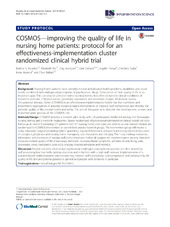| dc.description.abstract | Background: Nursing home patients have complex mental and physical health problems, disabilities and social needs, combined with widespread prescription of psychotropic drugs. Preservation of their quality of life is an important goal. This can only be achieved within nursing homes that offer competent clinical conditions of treatment and care. COmmunication, Systematic assessment and treatment of pain, Medication review, Occupational therapy, Safety (COSMOS) is an effectiveness-implementation hybrid trial that combines and implements organization of activities evidence-based interventions to improve staff competence and thereby the patients’ quality of life, mental health and safety. The aim of this paper is to describe the development, content and implementation process of the COSMOS trial. Methods/Design: COSMOS includes a 2-month pilot study with 128 participants distributed among nine Norwegian nursing homes, and a 4-month multicenter, cluster randomized effectiveness-implementation clinical hybrid trial with follow-up at month 9, including 571 patients from 67 nursing home units (one unit defined as one cluster). Clusters are randomized to COSMOS intervention or current best practice (control group). The intervention group will receive a 2-day education program including written guidelines, repeated theoretical and practical training (credited education of caregivers, physicians and nursing home managers), case discussions and role play. The 1-day midway evaluation, information and interviews of nursing staff and a telephone hotline all support the implementation process. Outcome measures include quality of life in late-stage dementia, neuropsychiatric symptoms, activities of daily living, pain, depression, sleep, medication, cost-utility analysis, hospital admission and mortality. Discussion: Despite complex medical and psychosocial challenges, nursing home patients are often treated by staff possessing low level skills, lacking education and in facilities with a high staff turnover. Implementation of a research-based multicomponent intervention may improve staff’s knowledge and competence and consequently the quality of life of nursing home patients in general and people with dementia in particular. | en_US |

